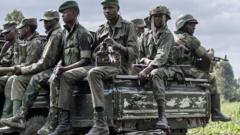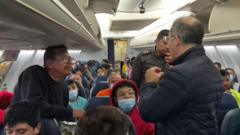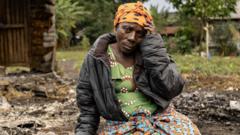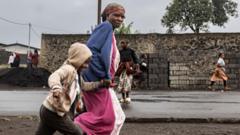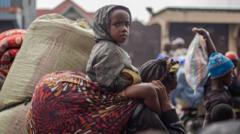Recent attacks by rival factions highlight the surge in violence, disruption of peace negotiations, and the humanitarian crisis unfolding in affected communities.
**Escalating Violence in Colombia: 60 Lives Lost Amid Gang Warfare**
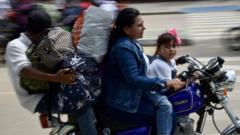
**Escalating Violence in Colombia: 60 Lives Lost Amid Gang Warfare**
In the Catatumbo region, a surge of violence fueled by drug gangs has resulted in 60 fatalities, drawing attention to the ongoing conflict.
The death toll from violent clashes between rebel groups in Colombia's Catatumbo region has risen to 60, according to reports from the country's human rights office. This spike in violence, largely attributed to longstanding disputes over the cocaine trade, has alarmingly displaced thousands of residents. The National Liberation Army (ELN) and the Revolutionary Armed Forces of Colombia (Farc) have engaged in confrontations that broke a fragile truce, undermining previous peace negotiations with the government.
The Ombudsman's Office noted that the recent wave of attacks involved various factions competing for control in an area that borders Venezuela, exacerbating tensions that have simmered for years. The rise in violence, which had initially reported 40 fatalities, now highlights the severe risk faced by community leaders and their families, with many falling victim to kidnappings and assaults. Most recently, the office reported that 20 individuals were kidnapped, including women.
Tragically, among those killed were seven individuals who had signed a peace treaty in 2016 and significant community leaders like Carmelo Guerrero, the head of the Association for Peasant Unity in Catatumbo (Asuncat). This advocacy group has expressed deep concerns over missing members, pointing to the pervasive threats in the region.
Food shortages are emerging as a consequence of the violence, impacting vulnerable populations, including children and the elderly. The Ombudsman's Office highlights the severe humanitarian implications as communities grapple with the aftermath of the conflict. "Catatumbo is once again stained with blood," said the Association of Mothers of Catatumbo for Peace, emphasizing the profound impact of the violence on families and community cohesion.
In response to the escalating situation, President Gustavo Petro condemned the ELN for "war crimes" and accused them of obstructing peace efforts. He has called for enhanced military presence in Catatumbo to restore order. The ELN, meanwhile, has placed blame on Farc for instigating the recent violence. This cycle of retaliation and blame has highlighted the volatile nature of Colombia's armed conflicts and the urgent need for peace initiatives.
As the Colombian army receives additional troops in the region, the international community watches closely, hoping for a resolution that will end the suffering of those caught in the crossfire of drug-related violence.
The Ombudsman's Office noted that the recent wave of attacks involved various factions competing for control in an area that borders Venezuela, exacerbating tensions that have simmered for years. The rise in violence, which had initially reported 40 fatalities, now highlights the severe risk faced by community leaders and their families, with many falling victim to kidnappings and assaults. Most recently, the office reported that 20 individuals were kidnapped, including women.
Tragically, among those killed were seven individuals who had signed a peace treaty in 2016 and significant community leaders like Carmelo Guerrero, the head of the Association for Peasant Unity in Catatumbo (Asuncat). This advocacy group has expressed deep concerns over missing members, pointing to the pervasive threats in the region.
Food shortages are emerging as a consequence of the violence, impacting vulnerable populations, including children and the elderly. The Ombudsman's Office highlights the severe humanitarian implications as communities grapple with the aftermath of the conflict. "Catatumbo is once again stained with blood," said the Association of Mothers of Catatumbo for Peace, emphasizing the profound impact of the violence on families and community cohesion.
In response to the escalating situation, President Gustavo Petro condemned the ELN for "war crimes" and accused them of obstructing peace efforts. He has called for enhanced military presence in Catatumbo to restore order. The ELN, meanwhile, has placed blame on Farc for instigating the recent violence. This cycle of retaliation and blame has highlighted the volatile nature of Colombia's armed conflicts and the urgent need for peace initiatives.
As the Colombian army receives additional troops in the region, the international community watches closely, hoping for a resolution that will end the suffering of those caught in the crossfire of drug-related violence.









